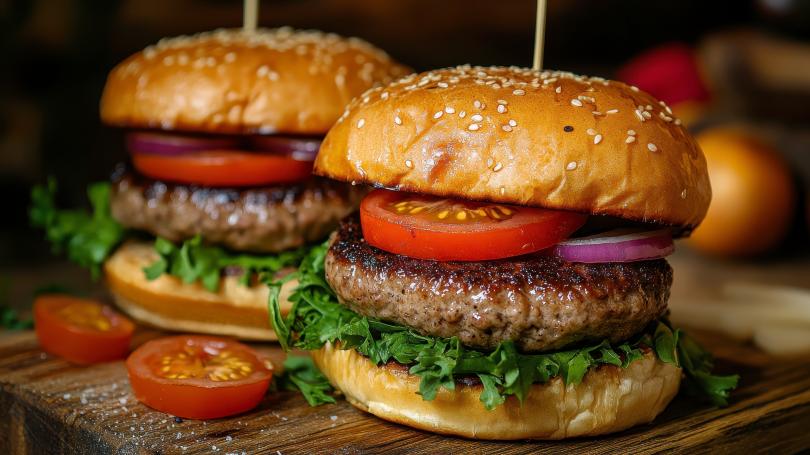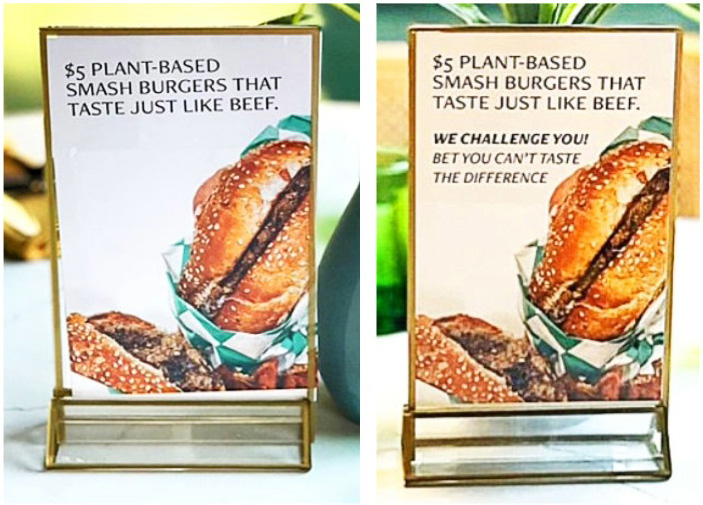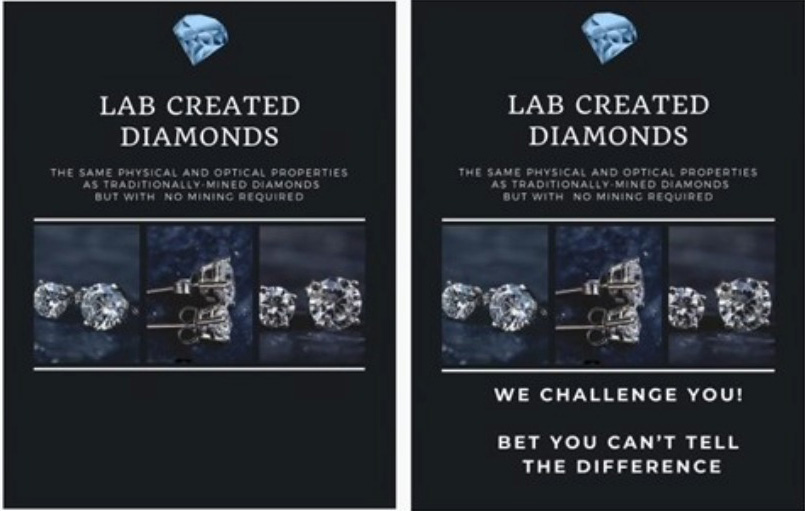From burgers to diamonds: How challenges nudge us toward ethical choices

The restaurant’s promotion was simple.
“New Beyond Chili. We challenge you to taste the difference.”
But would the challenge convince customers to try their chili made with plant-based beef?
It’s a question that faculty colleagues Maria Landekhovskaya and Rebecca Walker Reczek had been curious about when they happened on the promotion at a Columbus area restaurant. And it’s the question that ultimately fueled Landekhovskaya’s first published research, “Similarity Challenge Appeals Motivate Consumers to Buy Virtuous Replacement Products.”
“Rebecca and I had been talking about whether similarity challenge appeals work, when we saw this ad,” said Landekhovskaya. “We wanted our research to be relevant and related to something already in use.”
Many restaurants have introduced plant-based alternatives to satisfy customer demand for meat substitutes and sustainably produced food. Similarly, jewelers like Pandora have replaced traditionally mined diamonds, which have been associated with child labor and environmental damage, with lab-created diamonds. The challenge for these restaurants and jewelers is to get consumers to try — and ultimately buy — new products, called virtuous replacement products by Landekhovskaya and her team.
Their research, published in April in the Journal of Public Policy & Marketing, defines a virtuous replacement product as one intended to offer a similar consumer experience to an existing product but that is produced in a more ethical manner (e.g., more sustainable or without human rights violations) by omitting a key characteristic of the original product. In the case of plant-based meat, the omission of the animal — a key characteristic — reduces greenhouse gas emissions commonly associated with beef production.
“There are many virtuous replacement products — diamonds, burgers, chocolate. We asked, what is the best way to give consumers an incentive to try them; can a challenge influence their behavior?” said Landekhovskaya.
Reczek, associate dean for faculty affairs and research and the Berry Chair of New Technologies in Marketing, and Grant Donnelly, associate professor of marketing and logistics, co-authored the study with Landekhovskaya, a senior lecturer in the college's Department of Marketing and Logistics and Department of Management and Human Resources.
“What we were trying to do in this research is see what psychological mechanism makes people interested in buying a virtuous replacement product,” said Landekhovskaya.
Through a series of field and lab studies, the researchers recorded consumer reaction to similarity challenges for plant-based beef, lab-fermented no-cocoa chocolate and lab-grown diamonds. The results found that consumers were more likely to purchase a virtuous replacement product when challenged to experience the difference for themselves.
“The whole idea of the challenge was already being used by restaurants like the one we visited. We wanted to find out how effective it was,” said Landekhovskaya. “We also wanted to demonstrate that it is not just for food items, but for every product that we describe as a virtuous replacement product.”

The initial field study took place at a Columbus, Ohio, restaurant that was promoting a plant-based burger on Thursday nights. The researchers enlisted the restaurant’s help by asking them to include a challenge in their promotion every other Thursday over an eight-week period.
A 4 x 6 card was placed on each table advertising the plant-based burger. In the similarity appeal with no challenge, the placard read, “$5 Plant-Based Smash Burgers That Taste Just Like Beef.” In the similarity challenge appeal, the placard included an additional sentence that read, “We Challenge You! Bet You Can’t Taste the Difference.”
The study found that customers were 30% more likely to order a plant-based smash burger when a similarity challenge appeal was present, compared to a similarity appeal with no challenge.
“The challenge messaging makes consumers perceive it is less risky to try this new product,” said Landekhovskaya. “The thinking is, if a company is challenging you there must not be any risks; the company is confident that the consumption experience will be the same.”
The field study was followed by a series of controlled online surveys. In one, more than 500 CloudResearch participants who identified as meat eaters who had never tried a plant-based product, were asked to imagine themselves eating in a restaurant and viewing an advertisement for a plant-based burger. One ad included a challenge to taste the difference, a second ad promoted the similarities between the burgers without the challenge language, and a third omitted both the challenge and similarity language. Consistent with the in-person study, participants indicated a greater likelihood of purchasing a plant-based burger when the promotion included a challenge.
“When you launch a new product, and you’re not sure the best way to incentivize customers, one way is to challenge them,” said Landekhovskaya, whose extensive marketing background includes five years with Coca-Cola as an environmental affairs and sustainability manager in their Public Affairs and Communication Department. “Since I come from the business world, the ability to collaborate with the restaurant and see the pieces come together was very exciting.”

Subsequent studies provided additional proof. An online survey of nearly 600 CloudResearch participants found that customers were 22% more likely to purchase cookies made with lab-fermented no-cocoa chocolate when a promotion for the cookies included a challenge. These participants were told their responses to the study would help a café decide which cookies to include on their menu of baked goods. The choices included a chocolate hazelnut wafer cookie labeled as a product “made with lab-fermented no-cocoa chocolate which does not rely on child labor to harvest cocoa.”
Only three countries — the United States (California), England and Germany — produce the lab-fermented chocolate used in their study, said Landekhovskaya.
In another test using the lab-fermented chocolate, 250 undergraduate students were presented with a menu of snacks they could purchase in the lab. They had a choice between a Hershey’s milk chocolate bar and a wafer cookie that they were told was made with “lab-fermented no-cocoa chocolate which does not rely on child labor to harvest cocoa.” They also were told that “it tastes just like traditional chocolate.” The survey results found that participants were 42% more likely to select the snack containing the lab-fermented chocolate when they were challenged to taste the difference.
A final supporting study featuring a similarity challenge for lab-created diamonds surveyed 400 Amazon Mechanical Turk Workers who were planning to purchase diamond jewelry for Valentine’s Day. As with the other studies, participants indicated an interest in purchasing lab-created diamonds when challenged to identify the difference between them and the traditional diamonds.
The research, however, found that it was not enough to emphasize the ethics of choosing a virtuous replacement product over a traditional product. Consumers ultimately want to know that there is little to no risk in trying the product.
“Customers need reassurance that their experience with the product will be the same or similar,” Landekhovskaya said. “If companies challenge me, it must be true, and there is no risk.”
